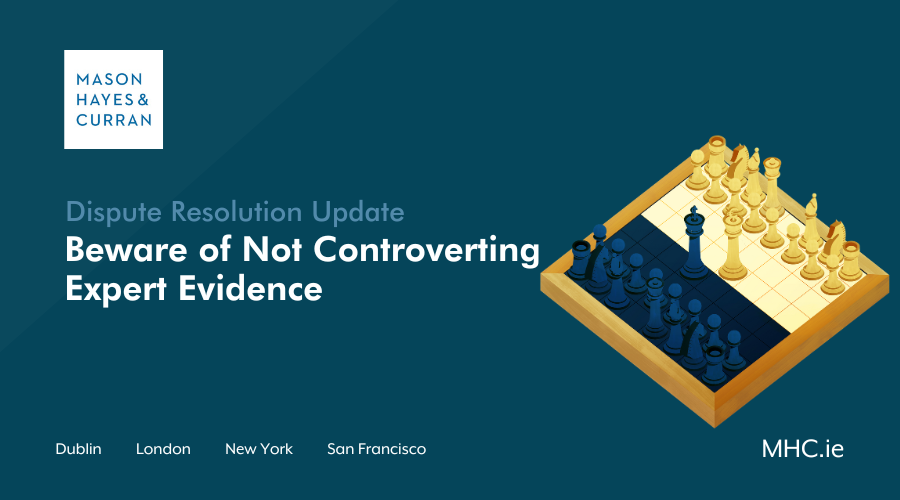Beware of Not Controverting Expert Evidence

The UK Supreme Court has recently given guidance on the proper approach the court should adopt when faced with uncontroverted expert evidence.[1] Ultimately, it concluded that only in exceptional cases, with seven classes of examples given, was a court entitled to disregard unchallenged expert evidence. Although it is a UK decision, this is persuasive before the Irish courts. Not only is the decision one of the highest authority, but the UK Supreme Court’s reasoning is founded on procedural fairness, which resonates strongly with Irish Constitutional principles. Accordingly, it is likely to be approved by the Irish courts should a relevant factual scenario ever fall to be considered in Ireland.
Background
Mr Griffiths, the appellant, bought an all-inclusive holiday from TUI, the respondent. During the holiday, he suffered gastric illness from allegedly contaminated food and drink consumed in the hotel. Proceedings were brought against TUI under the applicable package holiday regulations and for breach of contract. In support of his case, Mr Griffith relied on the expert evidence of a microbiologist regarding causation, who maintained the illness was caused as Mr Griffin had argued. The expert’s written report was terse and gave short answers to questions posed regarding the report under applicable court rules. TUI did not submit its own expert evidence from a microbiologist and did not require Mr Griffith’s microbiologist to attend for cross-examination, as his evidence was admitted on paper.
Instead, counsel for TUI had, for various reasons, criticised the expert report as poorly reasoned and unreliable in a skeleton argument filed the afternoon before and in closing submissions at the hearing. The trial judge agreed, holding that it was for Mr Griffiths to prove his case and the expert’s evidence was not satisfactory. In the High Court[2], that decision was overturned. However, in the Court of Appeal, the High Court decision was overturned, with the County Court trial decision confirmed by a majority. One of those in the majority, Lady Justice Asplin said that she could “see nothing which is inherently unfair in seeking to challenge expert evidence in closing submissions”. Although she described not offering contrary evidence or not cross-examining the expert as a “high risk strategy”, she said there “was nothing impermissible about it”.[3] Mr Griffiths brought a further appeal to the Supreme Court.
Supreme Court decision
The Supreme Court decision delivered by Lord Hodge was unanimous in upholding Mr Griffith’s appeal. Essentially, for the UK Supreme Court, the case involved a question of the fairness of the trial. More specifically, it raised an issue as to the scope of the rule that a party should challenge by cross-examination evidence it wishes to dispute in submissions at the end of the hearing. Specifically, did that rule extend to attacks on the reasoning of an expert witness and, if so, was the conduct of this trial unfair?
In addressing these, Lord Hodge recounted some well understood propositions, including that:
- The burden of proof rests on the party advancing the case
- The role of an expert is to assist the court, but must not usurp the judge as the ultimate decision maker, and
- The judge is to assess the adequacy and persuasiveness of an expert’s evidence
Fundamentally, however, the proceeding are adversarial in nature and the role of the judge is to ensure they are fair. One rule to ensure fairness is the requirement to challenge, by cross-examination, the evidence of any witness of the opposing party if there will be a submission to the court that the evidence should not be accepted on that point.
Ultimately, the Supreme Court determined that, unless the uncontroverted expert’s evidence is incredible, it should be accepted. Lord Hodge further outlined that not following an opinion expressed by an expert who has not been subjected to cross-examination will usually render a trial unfair. He explained that a central principle of fairness is that the parties must each have a fair opportunity to address the case made against them. In this case, however, the critique that prevailed at trial was raised only in the skeleton argument and in closing submission. At that point, it was far too late for Mr Griffiths’ expert to attend to answer the criticism made against his report. However, the Supreme Court did recognise that it was not appropriate to apply the rule rigidly in all cases and there were circumstances where it may not apply. The Supreme Court went on to identify seven classes of exceptions where it may be permissible for the court to disregard uncontroverted expert evidence. Examples include where:
- The evidence is manifestly incredible so that cross-examination would make no difference
- There is an obvious mistake in the expert’s evidence, or
- The basis for the expert report is not supported by the underlying evidence of witnesses with personal knowledge of the facts relevant to the case.
In considering the evidence put before the court at trial, Lord Hodge also expressed the view that Mr Griffiths had succeeded in proving his case on the balance of probabilities. He also noted that permitting a detailed critique of an uncontroverted expert report ran contrary to certain principles set out in the court rules and could encourage experts to produce unduly lengthy reports at unnecessary cost.
Conclusion
Despite the fact it is UK authority, the decision generally highlights the danger in not controverting expert evidence. In particular, a party should not assume that they will be able to legitimately criticise the expert evidence of an opposing party in closing submissions, especially where they have not challenged that expert’s evidence in cross-examination. Accordingly, practitioners should think carefully before deciding not to challenge the disputed expert evidence of an opponent. Conversely, for a party whose expert evidence is uncontroverted, in the event the court does disregard that evidence, it would seem there is a sound basis for an appeal unless one of the exceptions can be said to apply.
For more information and expert advice on commercial disputes, contact a member of our Commercial Disputes team.
The content of this article is provided for information purposes only and does not constitute legal or other advice.
[1] TUI UK Ltd v Griffiths [2023] UKSC 48.
[2] [2020] EWHC 2268 (QB)
[3] [2021] EWCA 1442
Share this:

Gerard Kelly SC
Partner, Head of Intellectual Property Law, Co-Head of Dispute Resolution
+353 86 820 8066 gkelly@mhc.ie

